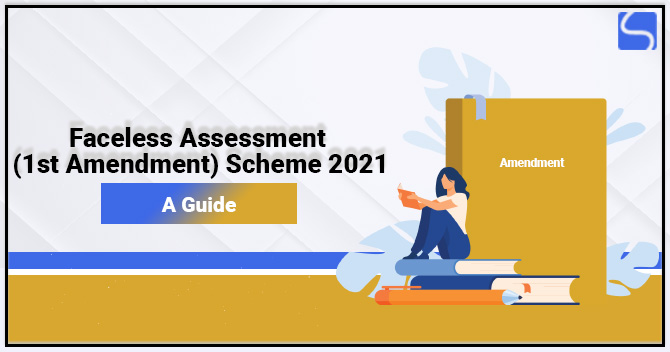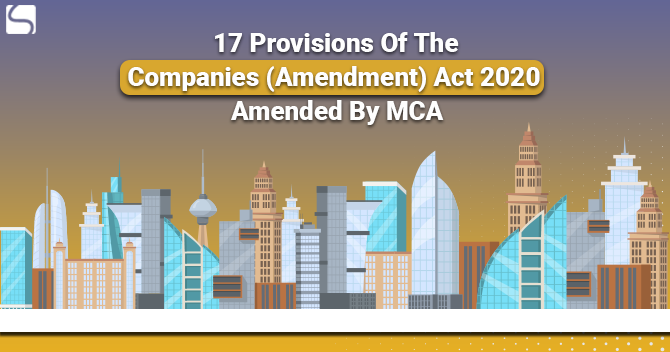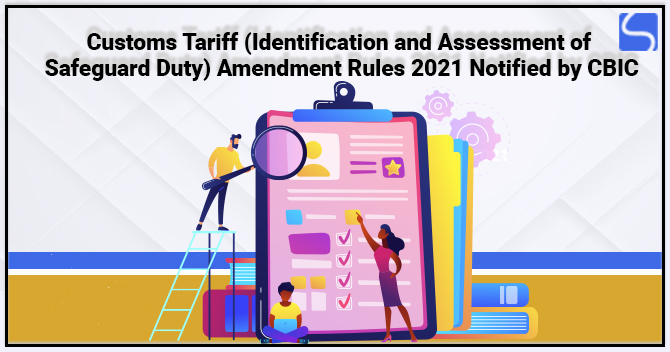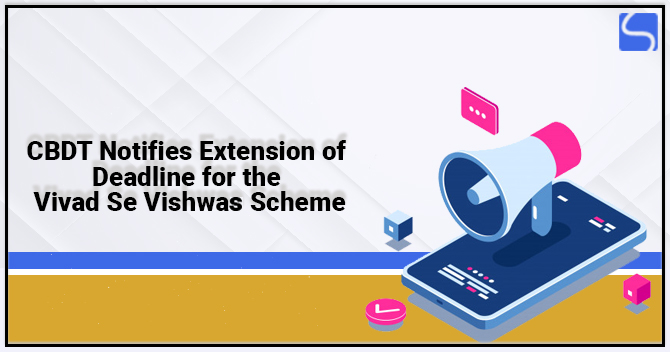Faceless Assessment (1st Amendment) Scheme 2021: A Guide

Shivani Jain | Updated: Feb 23, 2021 | Category: News
The Central Board of Direct Taxes has recently notified the Faceless Assessment (1st Amendment) Scheme 2021 by way of a notification issued on 17.02.2021. The said scheme seeks to amend the provisions of the Faceless Assessment Scheme 2019. Further, the amendments made relate to “changes in definitions”, “no personal appearance in the Centres and Units” and “Substitution in the procedure for assessment”. Also, the said rules will come into force from the date of publication in the official gazette.
In this blog, we will discuss about the key provisions of the Faceless Assessment (1st Amendment) Scheme 2021, together with the reasons for implementing it.
Table of Contents
Concept of Faceless Assessment
The term “Faceless Assessment” means a major reform undertaken by the Central Government that purposes to “eliminate human interface” between the Income Tax Department and Taxpayer.
According to this scheme, the selection of taxpayers is made only through systems that use Data Analytics and Artificial Intelligence. Further, it can be stated that the concept of Faceless Assessment works to eradicate “Territorial Jurisdiction”.
Also, it shall be pertinent to state that under this mechanism, an assessee or taxpayer will belong to one city, but the order for his/ her income tax assessment, review, and case finalisation will happen in another city. That means there is no need for a taxpayer to visit income tax officials regarding his/ her case, as the same will be allotted in a random manner.
For example: A taxpayer resides in Patna, but his/ her Tax Assessment might take place in Ghaziabad, Review in Mumbai, and Case Finalization in Rajkot.
Moreover, any tax assessment done outside the domain of Faceless Assessment will be considered invalid.
Also, Read: MCA Notifies Amendment to Definition of Listed Companies
Key Features of Faceless Assessment
The key features of the faceless assessment system are as follows:
- Selection of a Taxpayer by using AI (Artificial Intelligence) and Data Analytics;
- Team-Based Assessment;
- Allotment of Cases on Random Manner;
- Eradication of the concept of Territorial Jurisdiction;
- No Physical Human Interface;
- Central Issuance of Assessment Notice with Documentation Identification Number;
- No need to Visit Income Tax Officials;
- Team-Based Review;
- Drafting of Assessment Order will happen in one city, tax review in the second city, and the finalization in the third city.
Exceptions of Faceless Assessment Scheme
The exceptions to the Faceless Assessment Schemeare as follows:
- Black Money Act;
- Benami Property;
- International Taxation;
- Cases pertaining to Tax Evasion, Serious Fraud, Sensitive and Search Matter;
Reason for Implementing Faceless Assessment (1st Amendment) Scheme 2021
The main reason behind the implementation of Faceless Assessment (1st Amendment) Scheme 2021 is to bring the provisions specified under the Faceless Assessment Scheme 2019 at par with the provisions of section 144B of the Income Tax Act 1961.
Changes made in Definitions of Faceless Assessment (1st Amendment) Scheme 2021
The key changes made in the definitions by way of Faceless Assessment (1st Amendment) Scheme 2021 are as follows:
Substitution in Clause (x)
In the said clause, the word “Email Account” will be substituted by the words “Registered Email Account”.
Insertion in Clause (xiia)
After clause (xii), a new clause (xiia) has been inserted, which deals with the Dispute Resolution Panel. Further, the term Dispute Resolution Panel will have the same meaning that is assigned to in clause (a) of sub section (15) of section 144 C of the Income Tax Act.
Substitution in Clause (xxiv)
In the said clause, the word “Video Telephony” will be substituted by the words “Video Conferencing or Video Telephony”.
Changes Made in the Procedure under Faceless Assessment (1st Amendment) Scheme 2021
The key changes made in the procedure for Faceless Scheme under the Faceless Assessment (1st Amendment) Scheme 2021 are as follows:
Service of Notice by the National e-Assessment Centre
Based on the provisions of the Faceless Assessment (1st Amendment) Scheme, it shall be the duty of the National E-assessment Centre to serve notice to the assessee under sub section (2) of section 143 of the Income Tax Act 1961. Also, the assessee needs to reply to the notice sent within fifteen days, starting from the date of receiving the notice.
Regional E-assessment Centre
Now the National E-assessment Centre will assign the case chosen for the purpose of E-assessment to a particular assessment unit in any Regional E-assessment Centre by way of an automated allocation mechanism.
Also, it shall be relevant to state that an assessment unit can request the National E-assessment Centre for acquiring more information, documents, and evidence from the said assessee or any other person. It can seek technical assistance from the technical unit as well.
Issuance of Notice to Assessee for Information
In case a request has made by the assessment unit to the National E-assessment Centre for further information, evidence, or documents from the assessee, then, in that case, the National E-assessment Centre will issue an appropriate notice for the same to the assessee. The said notice would specify the time limit for furnishing the information, documents, or evidence asked.
After that, the assessee needs to file a reply to the said notice within the time specified by the National E-assessment Centre.
Automated Allocation Centre
In case a request for seeking Technical Assistance has been made by the Assessment Unit to the Technical Unit, then, in that case, the National E-assessment Centre will assign the request raised to the Technical Unit in any Regional E-assessment Centre by way of an Automated Allocation System.
Failure of Assessee in Complying with the Directions of the Notice Issued
If in case an assessee fails to adhere to the directions specified in the notice, issued under sub section (2A) of section 142 of the Income Tax Act 1961, then, in that case, the National e-Assessment Centre will issue the said assessee a notice under section 144 of the Act.
Further, the notice issued under section 144 of the Act will act as an opportunity to show cause on the date and time specified as to why the assessment in his/ her case should not be finished to the best of its judgement.
If, in case, the assessee again fails to respond to the notice, the National E-assessment Centre will inform the Assessment Unit regarding the same.
Further, the assessment unit will, after taking into consideration all the pertinent material available on the record in the writing form, will draft the assessment order.
However, in the case where the intimation has been received from the National e-Assessment Centre, the assessment unit will draft an assessment order to the best of its judgment. Also, it will send a copy of the said judgment to the National E-assessment Centre.
Moreover, the Assessment Unit will specify about the penal proceeding to be initiated against the assessee, if in case any.
Examination of Order Drafted by National E-assessment Centre
The National e-Assessment Centre will examine the draft order passed by the assessment unit. The said order must be in consonance with the risk management strategy as prescribed by the Board.
If in case the National E-assessment Centre is satisfied with the order drafted, it will serve a copy of the order made, together with the notice for the initiation of penalty proceedings. Also, a demand notice specifying the amount to be paid or refund due will be sent to the assessee.
However, if in case the National E-assessment Centre is not satisfied with the order drafted, it will grant an opportunity of being heard to the assessee as to why the proposed variation must not be made.
Also, it can ask any of the Regional E-assessment Centre to conduct a review of the order drafted by way of an automated allocation system. Further, the review unit will conduct the review of the order drafted and will decide the concurrence of such an order. Moreover, the designated Regional E-assessment Centre will send its suggestion about the concurrence of the Order to the National E-assessment Centre.
Filing of Objections by Assessee to the Dispute Resolution Panel
If in case the eligible assessee files his/ her objections with the DRP (Dispute Resolution Panel), then, in that case, the National e-Assessment Centre will upon receipt of the directions passed by the Dispute Resolution Panel under sub section (5) of section 144 C of the Income Tax Act, forward such issued directions to the respective assessment unit.
Further, the assessment unit will, in conformity with the directions notified by the Dispute Resolution panel under sub section (5) of section 144 C of the Income Tax Act prepare a draft assessment order in consonance with sub section (13) of section 144 C of the Income Tax Act and will send a copy of such a drafted order to the National e-Assessment Centre.
Duties of National E-assessment Centre
The National e-Assessment Centre will, upon receipt of the drafted assessment order, as specified in clause (xxx), finalise the assessment within the prescribed time limit as allowed under sub section (13) of section 144 C of the Income Tax Act 1961.
Also, it will serve a copy of such a drafted order and notice for the initiation penalty proceedings, if in case any, to the assessee, together with the demand notice, mentioning the total sum payable by, or refund of any amount due to the said assessee, based on the assessment made.
Further, the National e-Assessment Centre will transfer the electronic records to the assessing officer for such an action as may be required by the provisions of the act. The said transfer will be made after the completion of the assessment.
Conclusion
In a nutshell, Faceless Assessment purposes to eliminate the human interface between the Taxpayer and Income Tax Authorities. Further, this scheme will work on the concepts of Data Analytics and Artificial Intelligence.
Moreover, the Faceless Assessment (1st Amendment) Scheme 2021 aims to bring the provisions mentioned under the Faceless Assessment Scheme 2019 at par with the provisions of section 144B of the Income Tax Act 1961. These rules were notified by the Central Government by way of notification issued on by way of a Notification, issued on 17.02.2021.
Lastly, the key provisions of the Faceless Assessment (1st Amendment) Scheme 2021 relate to changes in definitions, no personal appearance in the Centres and Units, and Substitution in the procedure for assessment. The said rules will be enforced from the date of publication in the official gazette.
Official Copy of Faceless Assessment (1st Amendment) Scheme 2021
Faceless-Assessment-1st-Amendment-Scheme-2021Also, Read: MCA21 Version 3.0: 1st Mission Mode E-Governance Project














